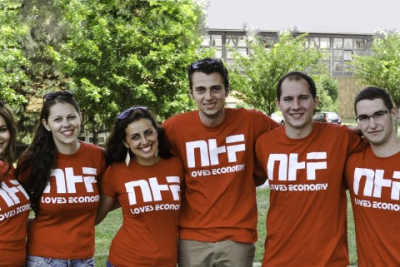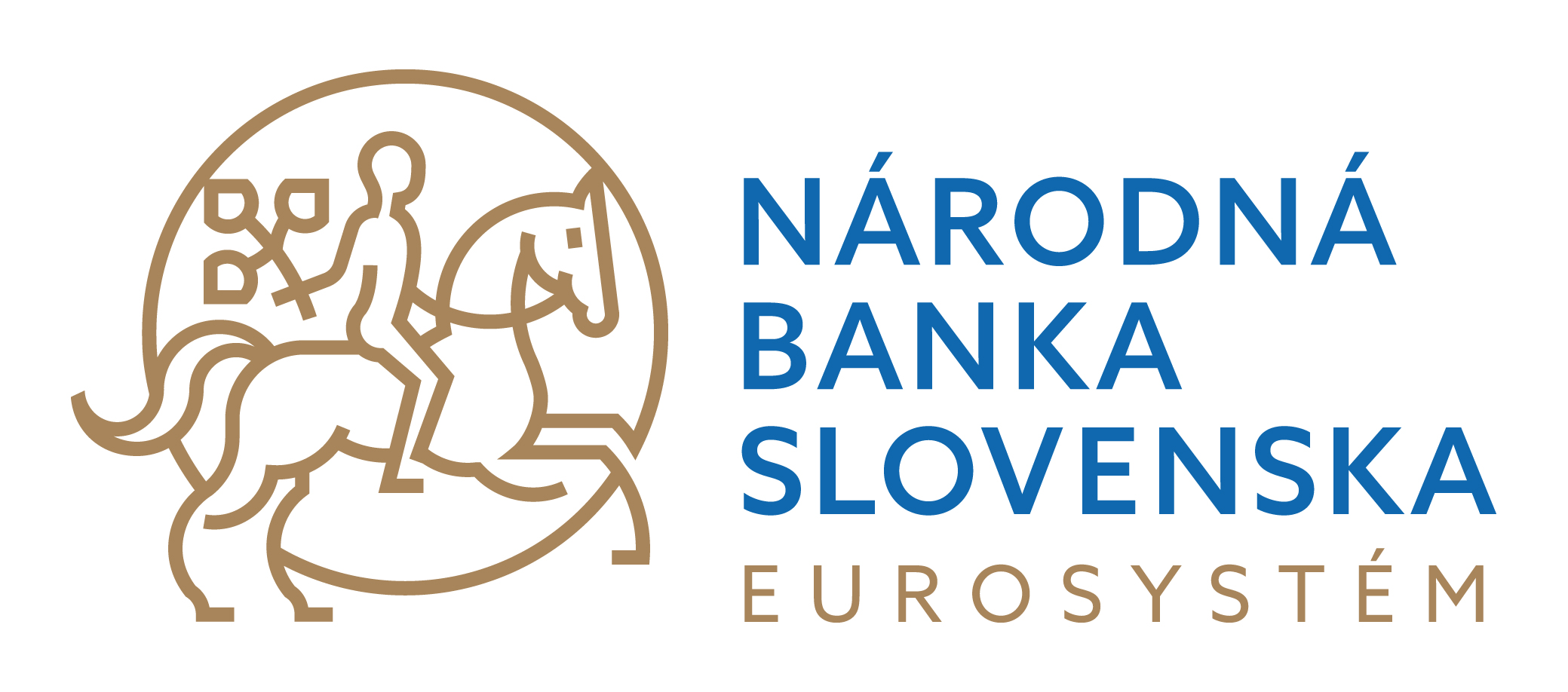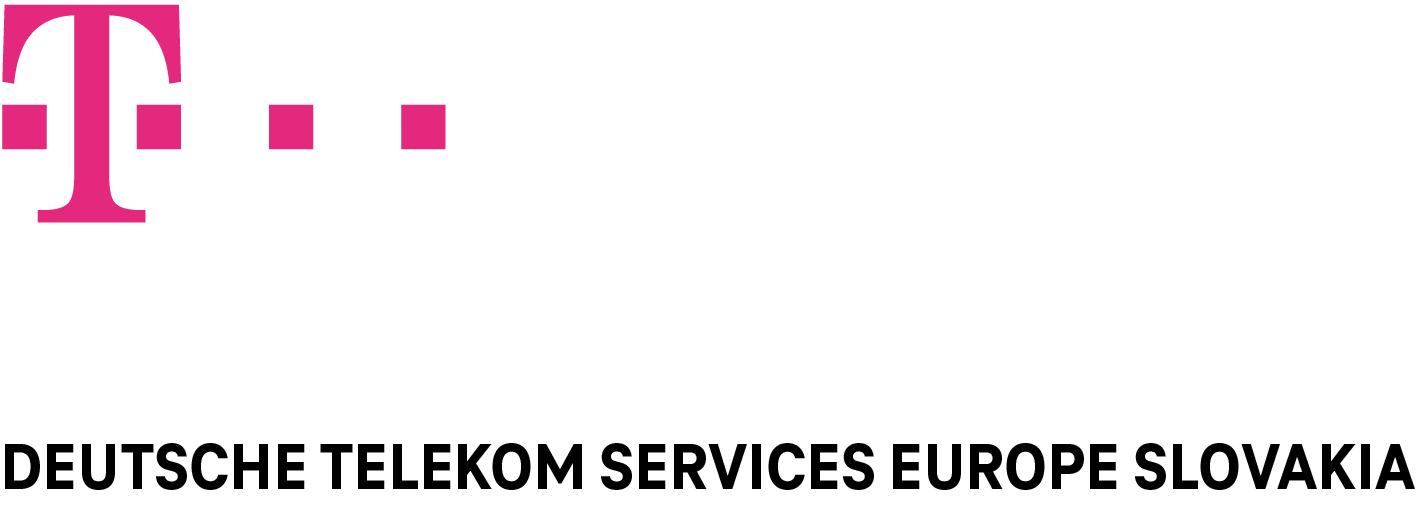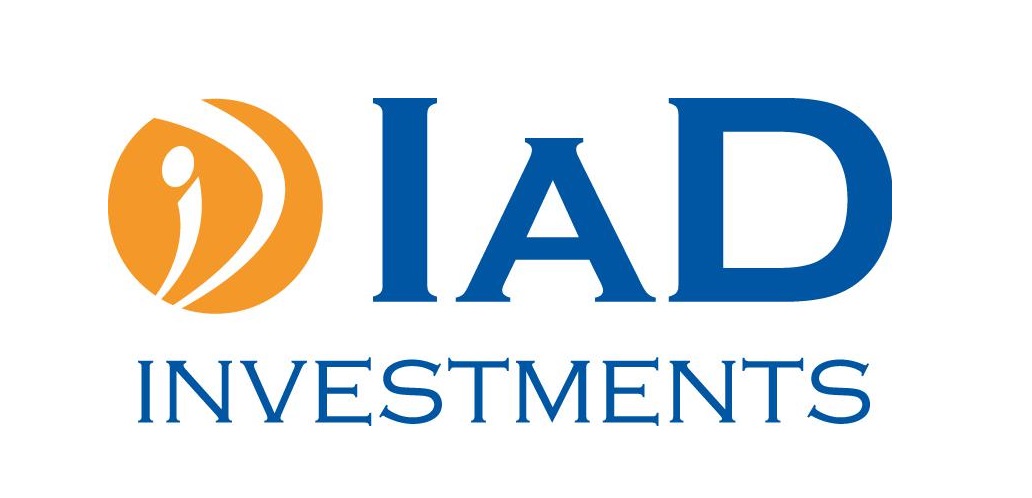The programme is open to applicants with a bachelor’s degree in finance, economics or related disciplines.
Applicants who have not finished their bachelor’s studies by the date of admission must provide an official confirmation of their ongoing studies along with the expected date of graduation. They can be given a conditional offer with the final decision to be taken upon delivery of the proof of completed bachelor’s degree.
The selection is based on the review of submitted documents.
- Graduation of the bachelor’s degree or higher in finance, economics or cognate studies.
- Submission of a legalized (notarized) copy of candidate’s university diploma (in English) in two copies.
- Foreign applicants or applicants, who completed the first degree of university study at foreign university, submit an application for recognition of university diploma (printed form is enclosed).
- If an applicant has not finished a bachelor’s study for the time being, he/she must submit a confirmation about currently passed studies. The applicant must also send the date of anticipated graduation.
- Submission of an academic transcript of all courses of passed study program with a statement of their range (hours/week), ECTS credits, grades and grading scale in two copies. Everything should be on letterhead of the university, together with signature of university representative and with the official stamp of the university (in English).
- In case of any ambiguities, University of Economics in Bratislava will ask for a submission of additional summaries of selected courses.
- Internationally accepted certificate confirming mastery of English is needed if the applicant has not yet studied in English. This certificate is not required if previous education or its relevant parts have been taught in English.
- Structured CV in English.
- Copy of identity card or passport.
- Two academic reference (recommendation) in English
- name and titles of referee, current position and current institution of the referee
- range, depth and the length of period the referee has known the applicant
- applicant´s preconditions for the selected study
- other important facts
- Motivation letter in English
- applicant’s reasons for the selected field of study
- self-assessment of preconditions and capabilities for further education
- personal contributions to the international student community (business practice, special skills, culture background and so on)
- Proof of 60,- EUR administration fee
Payment of the fee on the account:
- Students with residence outside SEPA here
- Students with residence within SEPA
- Students with residence outside SEPA here
| Beneficiary´s account name: | Ekonomická univerzita v Bratislave Dolnozemská cesta 1 Bratislava, Slovakia |
| Beneficiary‘s account number | IBAN: SK47 8180 0000 0070 0008 0671 |
| Beneficiary‘s bank: | Statna pokladnica Radlinskeho 32 Bratislava, Slovakia |
| BIC/SWIFT: | SPSRSKBAXXX |
| Remittance information : | Name, Study program |
- Completion of the application form.
The deadline for acceptance of application form, including payment of the administration fee, is 31st May 2019.
- Address for sending applications
Ekonomicka univerzita v Bratislave
Národohospodárska fakulta
(Application for study)
Dolnozemska cesta 1/b
852 35 Bratislava 5
Slovak Republic
Opportunity to obtain scholarship for Ukrainian students. For more information see attachment.
Acceptance into the study program
- The Admission Commission will review submitted documents of applicants and determine their ranking. The commission will accept only complete applications. The number of selected students will depend on the quality and quantity of all potential applicants and the capacity of the university.
- Selection procedure will be held from 1st June to 30th June, 2019. It goes ahead without participation of applicants on the ground of examination of submitted documents.
- If an applicant has not finished the 1st degree of university study, because his/her study will be finished later, he/she will be accepted to the study conditionally. This kind of applicant is obliged to submit together with application form a document about completed study for the time being and a document about supposed term of graduation of the 1th degree of university study confirmed by signature of university representative and university stamp. Final decision about acceptance to the study will be given after submitting the certificate about graduation of the 1th degree of university study.
- Date of the notification about acceptance for the study program
A decision about acceptance will be sent by post by 31st July, 2019 (the latest term). Accepted applicants will get documents back on request if it is necessary for arrangements of long-term visa or temporary stay. - Information about conditions considering to entry of foreigners and stay of foreigners in the Slovak Republic are accessible on http://mic.iom.sk/sk/home.html (Migracne informacne centrum)
Registration to the study program
Students accepted to the study program have to take part in the enrollment process in person. It will be held in September, 2019 The academic year 2019 – 2020 will start on September, 16th 2019.
In accordance with Slovak juridical system University of Economics in Bratislava has got a claim to require an information from accepted applicants, if they will enroll at a study. If an applicant does not provide university with information in the term prescribed by the University Act, his/her right to enroll at a study expires.
Tuition fee
The tuition fee is 1 500,- EUR per academic year. Tuition has to be paid before the beginning of the academic year, hence before day of enrolment.
Payment of the tuition on the account:
Ekonomicka univerzita v Bratislave, Dolnozemska cesta 1/b, 852 35 Bratislava, Slovak Republic
Account Nr: 7000080671/8180
Variable Symbol:
SWIFT: SUBASKBX
IBAN: SK47 8180 0000 0070 0008 0671
Bank: VÚB, a. s., Mlynske Nivy, Bratislava
| Program Code Name | iIF_15 |
| Duration | 2 years |
| Form of Study | full-time |
| Degree | Ing. (equivalent to MSc.) |
| Language | English |
| Application Period | 1 January - 30 April |
| Start | September |
| Tuition Fee | € 1 500 per year |
Cost of living
The university provides accommodation and meals in its own facilities.
Estimated costs of living per one month are about 300 – 400 euros.
Scholarship
University of Economics in Bratislava does not provide students with scholarship other than Scholarship for Ukrainian Students .
International Finance is a graduate study program:
Compulsory CoursesMicroeconomicsInternational Finance International Taxation Management and Operations of Commercial Banks Financial Controling Macroeconomics Financial Forecasting Financial Operations Public Finance Management Corporate Finance Information Systems and Programming in Finance Financial Analysis and Prognosis Tax Theory and Tax Policy International Financial Markets Derivates Markets Corporate Policy and Investment Strategy Dissertation | Optional CoursesLocal FinanceInternational Financial Centers European Union Monetary Policy of the EU Intercultural Differences Investment Banking Economic Models in International Finance (and other courses) |
Study program support critical thinking, which is an essential characteristic of master degree course. It encourages students to deeply and thoroughly analyze theories, problems and open questions in order to be able to formulate a balanced argument to explain the internal processes in organizations. An important part of critical thinking is a reflection and evaluation to assess the problem and get the right decision.
Planning, implementation and results of decisions are an integral part of professional life. This requires both operational and strategic decisions. Expected outcomes of the study program reflect this important capability. Decision-making with creativity and curiosity allow individuals to look at problems from different perspectives and propose competent and accurate solutions to problems.
It is needed in globalized world that students take into account the international context. An important element of the study program International Finance is to develop the ability to analyze the situation in a global context.
Within Joint programme students spend the 4th semester of study at a renowned university in the UK – Nottingham Trent University, and gain joint degree. This significantly increases international dimension of the study program.
Academic title
International Finance study program is a master study program. Graduates are granted academic title of ingénieur in abbreviation Ing. This academic title is Slovak Republic equivalent of academic title Master of Science (MSc). Upon successful completion of joint programme students will be awarded with a joint MSc certificate signed by the Rectors from both institutions (University of Economics in Bratislava and Nottingham Trent University).
Testimony

Petronela Rudzanova
Financial Analysis Senior Manager at Dell
I graduated EUBA almost 20 years ago in time when our country was still in process of change to democratic system. At that time there were not many job opportunities especially in global companies. This school gave me flexibility to study and start my career in one of few international companies (Volkswagen) at the same time. It also enabled future opportunities to grow my career in other global big companies that came to country later (Lear Corporation, Schindler and now Dell). It also gave me opportunity to meet most talented peers from the whole country. Some of them become my colleagues later. This school gave me full range of finance related education which basically mean that I could start in any area of finance either in private or public sector (tax, accounting, FP&A, banking, Ministry of Finance etc.). I have been with Dell for 13 years and there is intense cooperation between Dell and EUBA. I personally was delivering lecture to EUBA students to help them connect their studies with real business environment. I think EUBA is best economic school in our country and I would recommend it to any student that would like to gain strong education in Economics.
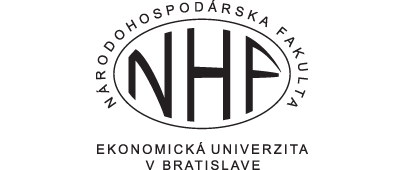

Two Year Master Study Program
Course Opening in September: Academic Year 2019 - 2020
Joint MSc Degree is delivered in collaboration with the Nottingham Business School of Nottingham Trent University. The study programme is practically oriented, improving the skills and experience that are highly relevant and valued by employers. Expected learning outcomes (knowledge and skills) reflect this goal. The programme includes studies in the dynamic developing market economy, as well as studies of international and intercultural structures of study groups. Slovakia and its capital lie in the center of Europe, with an interesting history, an original culture and extraordinary natural beauty. This study program is designed for graduates with bachelor degrees in finance, economics and cognate study programs. Upon successful completion of this programme students will be awarded with a joint MSc certificate signed by the Rectors from both institutions (University of Economics in Bratislava and Nottingham Trent University).
Nottingham Trent University has been named University of the Year at the Times Higher Education awards 2017
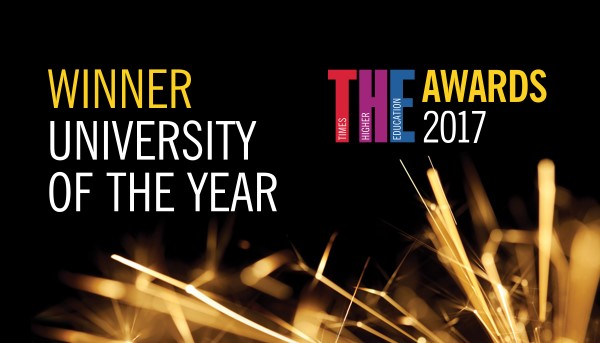
We are delighted to announce that NTU has been named University of the Year at the Times Higher Education awards 2017.
These prestigious annual awards celebrate the outstanding contributions and achievements of UK universities. The title of University of the Year is the most coveted honour available. Judges said the University’s innovative and systematic approach to enabling students to fulfil their academic potential and, in particular, the University’s commitment to supporting students from less privileged backgrounds had led to the title. NTU was named Modern University of the Year in The Times/Sunday Times Good University Guide and has won two awards at the Green Gown awards ceremony. Furthermore NTU has been placed third in The People and Planet University Green League. As well as these industry awards, NTU teaching also achieved the highest Gold award in the Government’s Teaching Excellence Framework.
These are evidence of the commitment and dedication that NTU shares when it comes to implementing the strategic plan built around ensuring both a value based and systematic approach to delivering equality of opportunity to students. This success would not have been possible without the ideas, energy, ambition and commitment of whole university community as well as the support from business, public services, and academic partners around the world. The University of the Year award is just the latest step in establishing NTU as a great university.
Dear colleagues I am delighted to announce that NTU has been named University of the Year at the Times Higher Education awards 2017. These prestigious annual awards celebrate the outstanding contributions and achievements of UK universities. The title of University of the Year is the most coveted honour available. Judges said the University’s innovative and systematic approach to enabling students to fulfil their academic potential and, in particular, the University’s commitment to supporting students from less privileged backgrounds had led to the title. This tops off what has been a phenomenal year in terms of recognition for the exceptional work of colleagues and students at our University. We were named Modern University of the Year in The Times/Sunday Times Good University Guide. We won two awards at the Green Gown awards ceremony and were placed third in The People and Planet University Green League. As well as these industry awards, our teaching also achieved the highest Gold award in the Government’s Teaching Excellence Framework. These are evidence of the commitment and dedication that we share when it comes to implementing our strategic plan built around ensuring both a value based and systematic approach to delivering equality of opportunity to our students. It is also rewarding to know that our students and our graduates are also transforming the lives of others. This success would not have been possible without the ideas, energy, ambition and commitment of our whole university community as well as the support from our business, public services, and academic partners around the world. The University of the Year award is just the latest step in establishing NTU as a great university. We should all be very proud. Edward Peck |
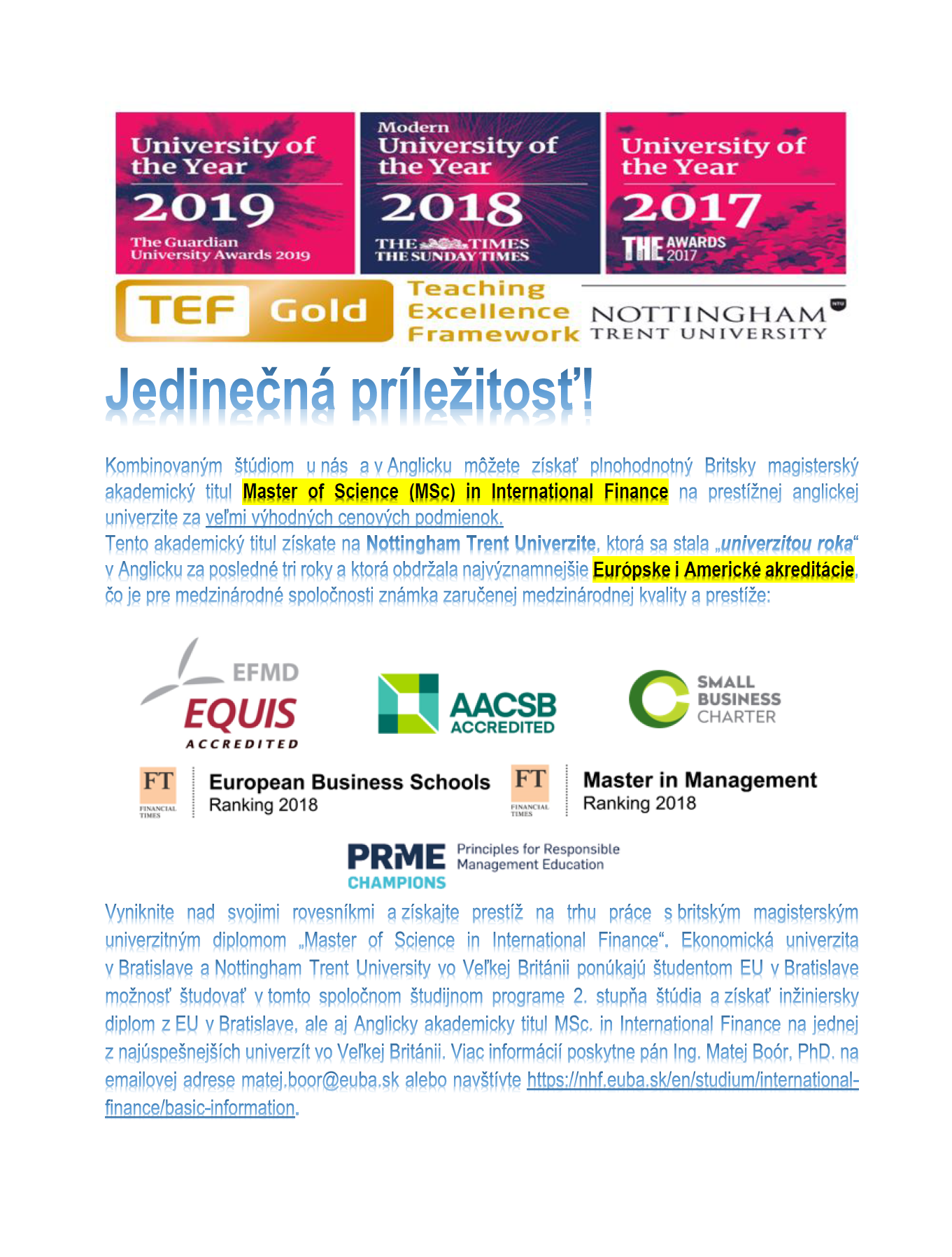
Odporúčaná literatúra na prijímacie pohovory pre spoločný študijný program Ekonómia a právo
pre predmet Náuka o spoločnosti
- KICZKO, L. – MARCELLI, M. – WALDSCHÜTZ, E. – ZIGO, M.: Dejiny filozofie.
- Bratislava, Slovenské pedagogické nakladateľstvo, 2008
- FÜRSTOVÁ, M. – TRINKS, J.: Filozofia. Bratislava, SPN, 2006.
- MIEDZGOVÁ, J.: Základy etiky. Bratislava, Slovenské pedagogické nakladateľstvo, 2007.
- KRSKOVÁ, A. – KRÁTKA, D.: Základy práva. 7. vydanie, SPN, 2008, Bratislava.
- Ústava Slovenskej republiky č. 460/1992 Zb. z 1. septembra 1992 v platnom znení
pre predmet Dejepis
- BARTL, Július – KAMENICKÝ, Miroslav – VALACHOVIČ, Pavol. Dejepis pre 1. ročník gymnázií. Bratislava : SPN, 2000.
- BARTL, Július – KAČÍREK, Ľuboš – OTČENÁŠ, Michal. Dejepis pre 2. ročník gymnázií. Národné dejiny. Bratislava : SPN, 2002.
- KAMENICKÝ, Miroslav – KODAJOVÁ, Daniela – TONKOVÁ, Mária. Dejepis pre 2.
- ročník gymnázií. Svetové dejiny. Bratislava : SPN, 2003.
- BARTLOVÁ, Alena – LETZ, Róbert. Dejepis pre 3. ročník gymnázií. Národné dejiny. Bratislava, SPN, 2005.
- KAMENICKÝ, Miroslav – KODAJOVÁ, Daniela – TONKOVÁ, Mária. Dejepis pre 3.
- ročník gymnázií. Svetové dejiny . Bratislava : SPN, 2006.
pre predmet Logika
- GAHÉR, F.: Logika pre každého, 3. doplnené vydanie, Bratislava, Iris, 2003.
- FÜRSTOVÁ, M. - TRINKS, J.:Filozofia, Bratislava: SPN, 2006: strany 47-79.
pre predmet Základy ekonómie a ekonomiky
- LISÝ, Ján a kolektív: Základy ekonómie a ekonomiky, Bratislava, Vydavateľstvo Ekonóm, 2014.
pre predmet Cudzí jazyk
- LASKOVIČOVÁ, Tatiana – ONDREJOVÁ Zuzana: Anglický jazyk – Príručka na prijímacie skúšky, Bratislava, Vydavateľstvo Ekonóm, 2012.
- POSPÍŠILOVÁ, Jana: Nemecký jazyk – Príručka na prijímacie skúšky, Bratislava, Vydavateľstvo Ekonóm, 2012.
- PAĽKOVÁ, Jana: Španielsky jazyk – Príručka na prijímacie skúšky, Bratislava, Vydavateľstvo Ekonóm, 2012.
- RIZEKOVÁ, Iveta – VITA, Tiziano: Francúzsky jazyk, Taliansky jazyk – Príručka na prijímacie skúšky, Bratislava, Vydavateľstvo Ekonóm, 2012.
- KVAPIL, Roman – RECHTORÍKOVÁ, Gabriela: Slovenský jazyk, Ruský jazyk – Príručka na prijímacie skúšky, Bratislava, Vydavateľstvo Ekonóm, 2012.
Študentský parlament Národohospodárskej fakulty EU v Bratislave (ŠPNHF) je študentskou organizáciou pôsobiacou na NHF EU. Členmi Študentského parlamentu sú študenti NHF, zástupcovia jednotlivých ročníkov. V súčasnosti má študentský parlament spolu 20 členov. Zoznam členov ŠPNHF nájdete na webe www.spnhf.sk.
Medzi hlavné úlohy študentského parlamentu patrí:
- zastupovanie študentov v akademických orgánoch,
- riešenie problémov, pripomienok a návrhov s vedením fakulty,
- informovanie študentov o udalostiach na fakulte a univerzite,
- organizácia študentskej vedeckej odbornej činnosti (ŠVOČ),
- organizácia študentských zábavných akcií (Beánia NHF a Lámavica),
- vypožičiavanie data video projektora,
- a mnohé ďalšie.
Sme spoluorganizátorom ekonomickej súťaže v strednej a východnej Európe určenej študentom stredných škôl: High School Business Challenge (HSBC) viac informácii na stránke: businessismore.eu
Na členov študentského parlamentu sa môžete obrátiť kedykoľvek uznáte za vhodné, v prípade, že potrebujete poradiť alebo pomôcť pri riešení vášho problému.
Zastihnete nás v čase úradných hodín v našej kancelárii č. 2B.57 ( stará budova, druhé poschodie, chodba dekanátu a študijného oddelenia NHF).
Každý štvrtok si môžete v našej kancelárii vyzdvihnúť aj aktuálne vydanie týždenníka o ekonomike TREND.
Študentský parlament NHF
Predseda: Sofia Šillerová
kancelária: 2B.57
tel: +421 2 6729 1256
web: www.spnhf.sk
facebook: www.facebook.com/spnhf
instagram: www.instagram.com/sp_nhf
Úradné hodiny - zimný semester:
| Deň | Čas |
| Pondelok | 12:30 – 13:30 |
| Utorok | 12:30 – 13:30 |
| Streda | 12:30 – 13:30 |
| Štvrtok | 12:30 – 13:30 |
Harmonogram akademického roka 2026/2027 na NHF EU v Bratislave
Harmonogram akademického roka 2025/2026 na NHF EU v Bratislave
Harmonogram akademického roka 2024/2025 na NHF EU v Bratislave
Žiadosť o sociálne štipendium
Zoznam príloh k žiadosti o sociálne štipendium
Prílohy
Ročné zúčtovanie preddavkov na daň zamestnancov
Vzory čestných vyhlásení
Potvrdenie príjmov z daňového priznania na účely sociálneho štipendia
Žiadosť o úpravu školného
Strategický partner
Hlavní partneri
Partneri

